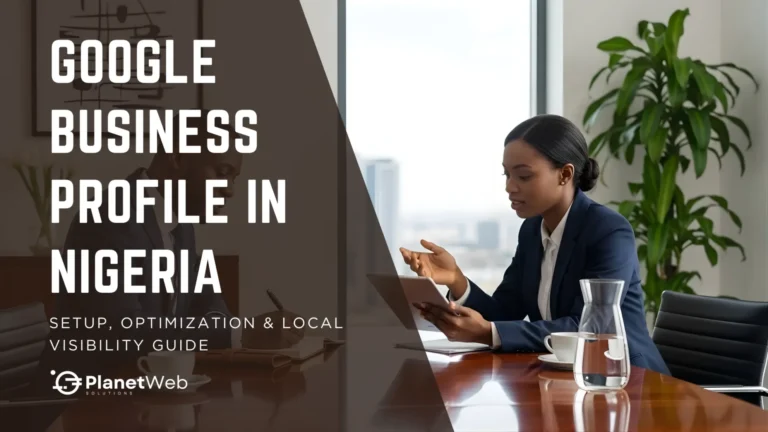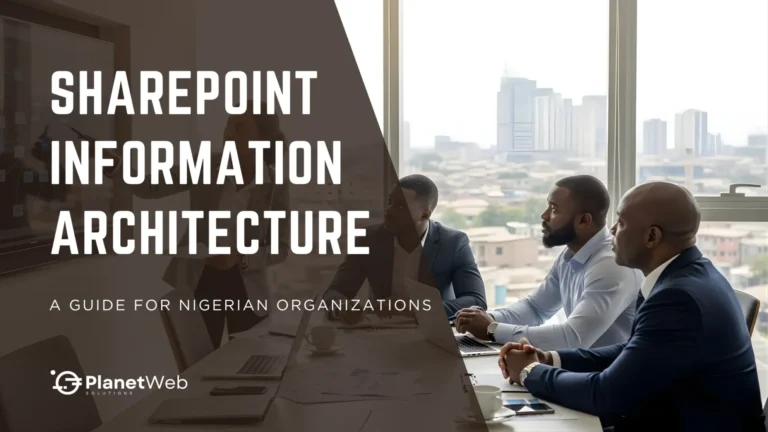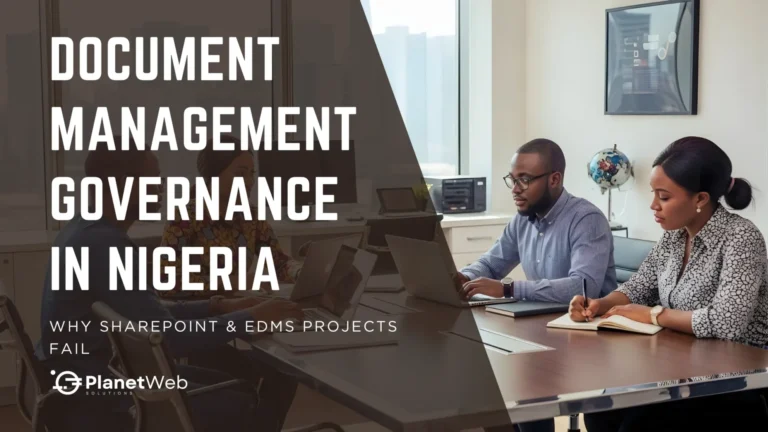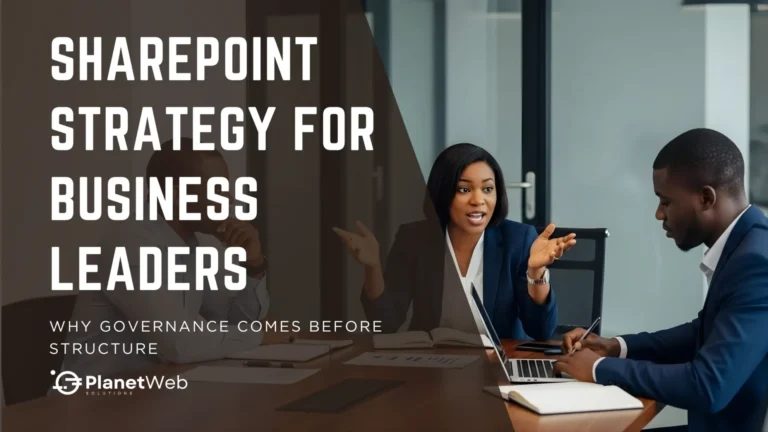Search Is Changing: So Should Your SEO
Something’s shifted in how Nigerians find businesses online. If you care about SEO in Nigeria, the playbook has changed. Five years ago, you’d Google something and scroll through pages of links. Now? You ask ChatGPT a question and get an answer. You say “Hey Google” into your phone while driving. You check WhatsApp status updates for business recommendations.
The common thread? People want answers, not homework. They’re not interested in clicking ten links to figure out which dermatologist in Lekki takes walk-ins. They want the information upfront.
This changes everything about how businesses need to think about online visibility. SEO isn’t dead, but it’s not the same game it was in 2015. The goal now is to make your business easy to find, understand, and trust, no matter where people are searching. That could be Google, an AI assistant, or a voice search while stuck in Lagos traffic.
What SEO in Nigeria Means Today
Let’s start simple. SEO helps your website appear when customers search for solutions online. That’s it.
But the how has changed. It used to be about gaming the system with keywords. If you wanted to rank for “best restaurant in Abuja,” you’d stuff that phrase into your page twenty times and hope for the best. Google got smarter. So did people.
Now SEO is about understanding what people actually want when they search, answering their questions clearly, and making your site technically accessible to both Google and AI tools that are increasingly answering questions on Google’s behalf.
Here’s a real example: when someone searches “affordable cleaning service Abuja,” Google isn’t just looking for pages that repeat those exact words. It’s looking for sites that provide clear, trustworthy, locally relevant information. It wants to know your service area, your pricing structure, what makes you different. It wants to see reviews, a phone number that works, maybe a WhatsApp contact link.
Service pages that list areas served, Naira price ranges, FAQs, and a working WhatsApp link are easier for both people and search engines to use. Modern SEO is about providing all that information in a way that both humans and machines can understand. Not tricks. Just clarity and usefulness.
Why SEO Still Matters: Especially in Nigeria
Some business owners figure they can skip SEO entirely. They’re on Instagram. They have a WhatsApp Business account. Isn’t that enough?
For day-to-day sales, maybe. But here’s what they’re missing: studies estimate that roughly 85% of Nigerians searching online are doing it from their phones. And most of those searches aren’t happening on Instagram. They’re happening on Google.
Think about the last time you needed something specific. A notary public near your office. An IT support company that handles small businesses. A clinic that does laser treatments without requiring you to book three weeks out. You probably Googled it.
That’s the behavior SEO captures. The difference between showing up in those moments and being invisible comes down to a few specific things:
Mobile users dominate. If your site is slow to load or hard to navigate on a phone, you’re losing people before they even read your first sentence. And in Nigeria, where many people are on limited data plans, a bloated website is a dealbreaker.
Local intent matters. Most searches in Nigeria include location. “Dentist Ikoyi.” “Web designer Lagos.” “Accountant near me.” Search terms often combine “near me” with city names, like “dermatologist Lekki” and “IT support Port Harcourt.” If your site doesn’t make it crystal clear where you operate and who you serve, you won’t be found.
Google Business Profile is your free billboard. Your listing on Google Maps, complete with reviews and photos, is often the first impression potential customers get. If it’s incomplete or inaccurate, they’ll move on to the next option. In our Lagos and Abuja audits, incomplete Google Business Profiles are the most common blocker to local visibility. Learn more about setting up local SEO properly to maximize your visibility in location-based searches.
Social media is rented land. Instagram can change its algorithm tomorrow and tank your reach. Your website? That’s yours. SEO builds long-term visibility that doesn’t depend on a platform deciding whether to show your content.
This is why SEO still matters, especially in Nigeria. It’s one of the few ways to build visibility and trust that doesn’t require you to constantly pay for ads or rely on the algorithm’s kindness.
What Search Engines Actually Look For
Google doesn’t just want to rank websites anymore. It wants to answer questions.
Go search something right now. Anything practical. You’ll probably see a “featured snippet” at the top: a boxed answer pulled from a website. Below that, a “People Also Ask” section with more quick answers. Maybe a map if it’s location-based. Maybe an AI-generated summary.
The days of “here are ten blue links, good luck” are over. Google wants to be the answer, and it pulls that information from websites that make it easy.
This is where a lot of businesses get confused. They think SEO is about tricking Google into ranking them higher. It’s not. It’s about organizing your information so clearly that when someone asks a question your business can answer, Google knows you’re the right source to cite.
Example: someone searches “how much does website design cost in Lagos?” If your site has a clear FAQ section, a blog post, or a service page that directly addresses pricing in Naira, with ranges, package options, and what’s included, you’re way more likely to show up. Not because you gamed the system, but because you actually answered the question.
The same principle applies to AI tools like ChatGPT and Perplexity. They’re pulling information from credible, well-structured websites to answer user questions. Answer-style formatting helps not only Google snippets but also AI tools when they look for clear sources to cite. If your content is clear and trustworthy, you get cited. If it’s vague or buried under jargon, you don’t. See our note on headings in WordPress website best practices.
Modern SEO is just making your information findable and usable. That’s the whole game.
Five Practical Ways to Succeed with Modern SEO in Nigeria
Here’s what actually works.
I. Create Question-Based, Helpful Content
Start by figuring out what your customers actually ask. Not what you think they should ask—what they do ask.
Write content that answers questions directly. Use simple language. Structure it with clear headings. Include an FAQ section on your service pages. When you write like you’re having a conversation with a customer, you naturally end up creating the kind of content that ranks.
Tools like Google’s “People Also Ask” feature or AnswerThePublic can help you find real questions people are typing in. Use them.
II. Keep Your Website Fast and Mobile-Friendly
This isn’t optional in Nigeria. Most of your visitors are using mobile devices, often with limited data connectivity. If your site takes fifteen seconds to load because you have massive uncompressed images and a dozen pop-ups, they’re gone.
Test your site speed using our WordPress speed optimization guide and the official Google PageSpeed Insights.
Your goal is to get people the information they need as quickly as possible. Speed isn’t just a ranking factor. It’s respect for your visitors’ time and data.
III. Strengthen Your Local Presence
If you serve customers in specific Nigerian cities, local SEO is your friend.
Start by claiming your Google Business Profile. Add your exact address, phone number, business hours, and photos. Keep this information consistent across all online platforms, including your website footer, Facebook page, and directory listings.
Get listed in Nigerian directories, such as VConnect and NGContacts. These help establish your local presence and often rank well independently. Also consider Bing Places and Apple Maps (via Apple Business Connect) for iOS users.
Encourage real customers to leave Google reviews. Don’t buy fake ones—they’re obvious and they hurt you. Just ask satisfied customers to share their experience. Then respond to reviews, good and bad. It shows you’re active and you care.
Ensure your website clearly indicates where you operate. Don’t make people guess whether you serve their area. Put it on your homepage, your contact page, and in your service descriptions.
IV. Make Your Content Easy for Search Engines to Read
This may sound technical, but the basics are actually quite simple. Use clear page titles and descriptive headings that clearly indicate to readers what’s on the page. Break up text with subheadings. Keep paragraphs short. Use bullet points when listing information.
If you have a developer or work with an agency, they can add something called “structured data” to help Google better understand your content. Think of it as labeling your information so search engines can read it more accurately. But here’s the key: if your content is already clear and well-organized, you’re 80% of the way there.
The main thing is to avoid walls of text with no structure. Write for humans first, then make small adjustments to help machines understand what you’ve written.
V. Build Topic Authority Over Time
Google doesn’t trust new websites immediately. You build trust by consistently publishing helpful content in your area of expertise.
If you’re an accounting firm, write about tax filing deadlines, business registration tips, and bookkeeping advice for small businesses. If you’re a medical clinic, create content about the common conditions you treat, preventive care, and what patients can expect during procedures.
Link related articles together. Update older content when information changes, and aim to review and refresh key posts on a quarterly basis. This builds what Google calls “topical authority”: it recognizes you as a credible source in your field.
What Good Content Looks Like for Nigerian Audiences
Here’s something most SEO guides won’t tell you: what works in the US or UK doesn’t always work in Nigeria. User behavior and expectations differ; your content must reflect this.
Nigerians respond to visuals. Before-and-after photos, customer testimonials with faces, short videos. If you’re a service business, show your work. If you’re a product business, show the product in use. Text alone won’t cut it. Add descriptive alt text to images; it helps both users and search engines.
Pricing transparency matters. International sites often encourage you to contact them for a quote. Nigerian customers want to see the Naira amount upfront. You don’t have to list exact prices for everything; instead, provide ranges. List payment options like Paystack, Flutterwave, bank transfer, POS, and cash to reduce drop-off for first-time buyers. This isn’t just SEO, it’s trust.
Keep text scannable. Short paragraphs. Clear headers. Use bullet points when listing features or steps to make the information easier to read. People are reading on their phones, often while doing something else. Respect that reality.
Local authenticity works. Mention specific Lagos neighborhoods, Abuja areas, or Port Harcourt landmarks. Use examples your audience will recognize. You don’t need to overdo it, but a little local flavor makes your content feel relevant rather than generic.
WhatsApp is king. Add a WhatsApp chat button to your site. Make your WhatsApp Business number prominent on your contact page. This is a trust signal in Nigeria. It allows people to easily reach you on a platform they already use.
Common SEO Mistakes Nigerian Businesses Make
Let’s talk about what not to do. These mistakes are costing Nigerian businesses visibility every day.
Copying content from foreign websites. You’re not in London or New York. Copying keyword strategies or service descriptions from international sites makes your content feel generic. Target the terms Nigerians actually use: “doctor” rather than “physician,” “dermatologist Lekki” rather than the generic “skin specialist.” Google knows where your business is located. Write for your actual audience.
Ignoring local directories. Sites like VConnect and NGContacts still matter for local SEO. Getting listed takes an hour. Not being listed means missing easy visibility opportunities.
No WhatsApp or local phone contact. International best practices say “use a contact form.” Nigerian best practices say “give me a phone number I can call and a WhatsApp I can message.” Not adding a WhatsApp click-to-chat button on mobile is a missed opportunity. Don’t make it difficult for customers to reach you.
Leaving out Naira pricing. Even rough ranges help. “Starting from ₦50,000” is infinitely better than “contact us for pricing.” It filters out time-wasters and attracts serious inquiries.
Instagram-only presence. Social media visibility is great for building community. But when someone Googles your service type plus your city, and you don’t show up? That’s money left on the table. Publishing only on social media without a basic services page (with pricing ranges and service areas) leaves opportunities on the table.
Slow, image-heavy pages. Beautiful design is nice. But if your homepage is 5MB of uncompressed images and takes twenty seconds to load on mobile data, people won’t see it. They’ll bounce before it loads.
Treating SEO as a one-time project. You can’t “finish” SEO. Search engines update their algorithms. Competitors improve their sites. Your business changes. SEO is ongoing maintenance.
Local Insight: Early Results from a Nigerian Clinic
Here’s something from a recent project we worked on. A Lagos-based clinic had a strong presence on Instagram but limited visibility on Google. People searching for their exact services in their area weren’t finding them.
We made small, focused changes. Rewrote service pages to clearly answer common questions. Added pricing information (ranges, not exact amounts). Optimized for speed. Made sure their Google Business Profile was complete. Added structured data so Google could understand their services better.
Within eight weeks, they hit #1 rankings for multiple high-intent skincare and laser treatment keywords. Not through ads. Just better information architecture and local relevance. Rankings fluctuate, but the sustained lift came from speed, clear service info, and local trust signals.
How to Stay Visible as Search Evolves
SEO isn’t dying. It’s adapting. And the businesses that will remain visible are those that focus on fundamentals that won’t change.
People will always need answers to questions. Search engines and AI tools will always need clear, credible sources to cite. Speed and usability will always matter. Local trust will always matter. These aren’t trends. They’re basics.
Yes, Google will continue to update its algorithm. Yes, AI tools will continue to evolve in how they present information. But if your content is genuinely helpful, clearly organized, and technically sound, you’ll be fine. You’re building on solid ground.
The businesses that struggle are those that chase hacks or ignore their website entirely. SEO isn’t magic. It’s just making your business visible to people who are already looking for what you offer.
If you’re just starting, focus on speed, clarity, and local presence. Those three things will get you 80% of the way there. Everything else is optimization.
If you’re already doing SEO but not seeing results, audit the basics. Is your site fast on mobile? Are you answering real questions? Is your Google Business Profile complete? Are you making it easy for customers to contact you? Usually, the issue is in the foundation, not the advanced tactics.
And if you’d like guidance on applying these strategies to your specific business, our digital marketing team at PlanetWeb can help you get started the right way. But whether you work with us or tackle it yourself, the principles stay the same: be clear, be helpful, be findable.
Frequently Asked Questions
Below are some quick answers to common questions business owners ask about SEO in Nigeria, from how long it takes to see results to what really drives visibility on Google and AI-powered platforms.






